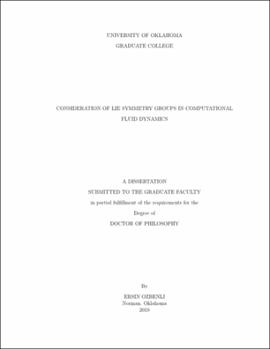| dc.contributor.advisor | Vedula, Prakash | |
| dc.contributor.author | Ozbenli, Ersin | |
| dc.date.accessioned | 2018-12-12T16:36:24Z | |
| dc.date.available | 2018-12-12T16:36:24Z | |
| dc.date.issued | 2018 | |
| dc.identifier.uri | https://hdl.handle.net/11244/316323 | |
| dc.description.abstract | Lie symmetries are fundamental properties of differential equations that are often not actively considered in construction of numerical schemes relevant to computational fluid dynamics (CFD). While many of these numerical schemes in CFD are constructed based on consideration of a desired order of accuracy and have shown promising results, these schemes usually do not accurately represent fundamental symmetry (or invariance) properties of underlying governing equations. The overall objective of this dissertation is to address this limitation via development of numerical schemes that not only preserve Lie symmetries of underlying differential equations but also ensure a desired order of accuracy.
In this regard, novel methodologies for construction of high order accurate invariant numerical schemes, based on the method of equivariant moving frames, are introduced. Formulation of high order accurate invariant schemes presented in this work involves consideration of (a) modified equations (via perturbation or defect correction) and/or (b) compact schemes. Modified forms of equations are used not only to achieve a desired order of accuracy in associated invariant schemes but also to systematically select convenient moving frames. Further, in the construction of invariant compact schemes, extended symmetry groups of differential equations are considered where point transformations based on these extended groups are used to transform existing base schemes to their invariant forms. Construction and performance of symmetry preserving numerical schemes are discussed for a variety of linear and nonlinear canonical problems (such as linear advection-diffusion equation in 1D/2D, inviscid Burgers' equation, viscous Burgers' equation along with application to Euler equations in 1D/2D). The overall quality of results obtained from constructed invariant numerical schemes is often found to be notably better than that of standard, non-invariant base numerical schemes. Such improvements in results are particularly more significant when error measures based on symmetry properties of underlying differential equations are considered. | en_US |
| dc.language | en_US | en_US |
| dc.subject | Computational Fluid Dynamics | en_US |
| dc.subject | Lie Symmetry Groups | en_US |
| dc.subject | Invariant Numerical Schemes | en_US |
| dc.subject | Symmetry Preservation in Numerical Schemes | en_US |
| dc.title | Consideration of Lie Symmetry Groups in Computational Fluid Dynamics | en_US |
| dc.contributor.committeeMember | Altan, M. Cengiz | |
| dc.contributor.committeeMember | Papavassiliou, Dimitrios | |
| dc.contributor.committeeMember | Merchan-Merchan, Wilson E. | |
| dc.contributor.committeeMember | Garg, Jivtesh | |
| dc.date.manuscript | 2018-08-21 | |
| dc.thesis.degree | Ph.D. | en_US |
| ou.group | Gallogly College of Engineering::School of Aerospace and Mechanical Engineering | en_US |
| shareok.orcid | 0000-0003-1138-9894 | en_US |
| shareok.nativefileaccess | restricted | en_US |
